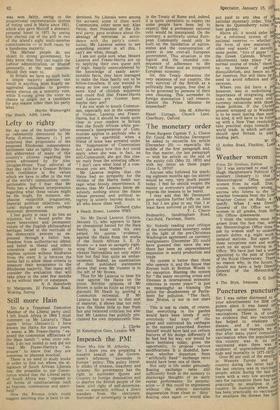Sir: Nobody reading your critique of the international monetary order
in the light of the pre-Christmas Washington agreement on currency realignments (December 25) could have guessed that since the war there has been an unprecedented expansion in world production and trade.
No system is better than those who operate it, and the house that Keynes built at Bretton Woods is no exception. Blaming the system for "the many recurring crises and illnesses in international economic relations in recent years " is just as meaningful as blaming the police for drunkenness or Parliament for pollution. "The fault, dear Brutus, is not in our stars
This is not to claim, of course, that everything in the garden would have been lovely if only everybody had kept off the grass and cultivated his cabbages in the manner prescribed. Keynes himself would have laid out certain features of his design differently if he had had his way, nor would he have hesitated today, given the opportunity, to propose various modifications. It is doubtful, however, whether departure from "artificially fixed" exchange rates would have been one of them.
Not only is life under genuinely floating exchange rates still sufficiently fresh in the memory to discourage thoughts of an early repeat performance. Its perpetuation — if this could be engineered without the almost inevitable degeneration from clean to 'dirty ' floating once again — would also
put paid to any idea of intat national monetary order. You c'ag have no Queensberry rules beer garden. Above all, it would defer herd,, for a reformed system of 1111c-i, national reserves — whether all the form of raw materials fit, other real assets" or merely, some prefer, "bits of paper" the Greek Calends. Where adjustments take place "in el' ra normal course of trade," there criic be no balance of pay-mean disequilibrium, and hence no ne`e for reserves. Nor will there be traic need to avoid inflation and nnl'a excesses.
Where you did have a nt
however, was in underlining l!im importance of integrating negolApt, tions on exchange rates and 'Os, currency valuations with those !iffE trade policies. If the Christrn,se present wrapped up in Washingtcci( is to be more lasting than most its kind, it will have to be foliaged up with a New Year resolution take practical steps towards fr_e`' world trade, in which self-intet` should spur Britain to play
leading part. JE 12 Arden Road, Finchley, LoncP s N3 rat










































 Previous page
Previous page